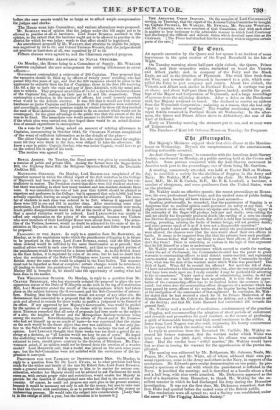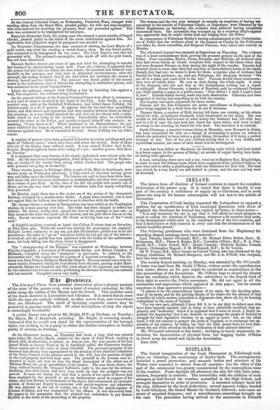ZbE Metropolis.
Her Majesty's Ministers enjoyed their first civic dinner at the Mansion-- house on Wednesday. Beyond the sumptuousness of the entertainment, nothing noticeable occurred.
An Auti-Slavery "League," in connexion with the American Anti-Slavery Society, was formed on Monday, at a public meeting held at the Crown and Anchor. Some persons connected with the Anti-Slavery movement in America took part in the proceedings; one of them being Mr. Garrison.
A meeting, numerously attended, was held at Exeter Hall on Wednes- day, to establish a society for the abolition of flogging in the Army and Navy. Mr. Wakley, M.P., was called to the chair. Mr. Hewett Bridge- man, M.P., Mr. IL B. Curteis, M.P., Mr. F. K. Lenthall, a barrister, a number of clergymen, and some gentlemen from the United States, were on the platform.
Mr. Wakley made an effective speech; the recent proceedings at Houns- low, his own professional knowledge, and the excited state of public feeling on the question, having all been turned to good account—
Speaking professionally, he remarked, that the punishment of flogging is so dangerous that no medical opinion could guarantee its safety at any tune. "A slight scratch on the skin will produce erysipelas and death; a trifling injury to the extremity of the finger will produce lock-jaw and death; even cutting the nail too closely has frequently produced death; the cutting of a corn too closely has likewise frequently produced death. But still it is held that lacerating, cut, scoring, pounding, mincing the backs of human beings, will not produce de; i and some persons speak of it as if it were not a disagreeable operation I " He had heard it said some nights before, that unless the punishment of the lash were allowed, the chances were that the men would shoot their own officers in battle. It seems to be supposed from this that the privates have such peculiari- ties of human feeling that they are likely to shoot their officers if their officers don't flog them I There is something so curious in the logic of that argument that he felt himself at a loss to understand it.
Mr. Wakley mentioned a circumstance which seemed to startle the meeting. Under the act of Parliament, the Commander-in-chief has the power to grant warrants to commanding-officers to hold district courts-martial; and regimental courts-martial may be held without a warrant from the Commander-in-chief Now, what was the date of the warrant under which White was punished? The 26th of April. When did he commit his offence? Not until the bth of June. " I have not adverted to this circumstance before; but, after the very unjust attacks that have been made upon me, I really consider I may be pardoned for adverting to the circumstance." Under such a mode of administering justice, he did not think that one man in thirty has been acquitted. It is true that the appro- bation of the commanding-officer has to be received before the sentence is exe- cuted: but when does the commanding-officer disapprove of a sentence which has been passed by seven officers of the regiment, the inquiry having been instituted, at the instigation of the commander of that regiment ? In conclusion, Mr. Wak- ley stated that he had received a check for 51. for Private Mathewson of the. Seventh Hussars from Mr. Collett the Member for Athlone, and a like sum in aid of the Society; and that Mr. Luke Hansard had contributed 201. towards the general fund. Mr. Wakley read a number of resolutions, condemnatory of the practice- of flogging, and recommending the adoption of short periods of enlistment' and rewards and promotions for good conduct, as the means of producing a spirit of honourable bearing and high moral sentiments in the soldier. A letter from Lord Nugent was also read, expressing his hearty concurrence in the object for which the meeting was called. In reply to questions from the Reverend Dr. Carlisle, Mr. Wakley re- peated his former statement, that the warrant under which White was tried was dated the 26th April, whereas his offence was committed in June. Had the verdict been " wilful murder," Mr. Wakley would have lost no time in issuing his warrant for the apprehension of the parties im- plicated. The meeting was addressed by Mr. Bridgeman, Mr. Johnson Neale, Mr. Pearse, Mr. Cleave, and Mr. Watts, all of whom adduced their own per- sonal experience, some in the Army and others in the Navy, in support of the resolutions. Mr. Edwards gave ocular demonstration on one point: he pro- duced a specimen of the cat with which the punishment is inflicted in the Navy. It horrified the meeting; and is described as a handle about a foot and a half long, with nine cords attache& Mr. Dickenson appeared as the head of a deputation from Hounslow, to thank Mr. Wakley for the ex- cellent manner in which he had discharged his duty during the Hounslow investigation. It was not the first time, Mr. Dickenson remarked, that the Iron Duke had quailed before the united voice of the British public. The resolutions were all agreed to; and a Society was established, under the name of " The Flogging Abolition Society."
At the Central Criminal Court, on Wednesday, Frederick Ware, charged with stealing Over from the Royal Mint, pleaded guilty; his wife and step-daughter, who were indicted for receiving the property, were not proceeded against. The man was sentenced to be transported for ten years.
Benjamin Alexander Ford, the young man who uttered a great number of forged checks, pleaded guilty to die whole of the seven indictments against him. An application that judgment might be postponed was acceded to.
On Thursday, Fitzsimmons, the man accused of robbing the Lord Mayor of a gold watch, was tried for stealing a watch from a shop. He was found guilty, and sentenced to be transported for ten years. The Lord Mayor's case was not proceeded with. The pdosoner's accomplice, who made off with the gold watch, has not been discovered.
Hannah Barker, twenty-one years of age, was tried for attempting to murder her husband by administering oxalic acid. From the evidence, it appeared that the poison was put into tea which the man drank; the husband had behaved very brutally to the prisoner, and they were in distressed circumstances; after the attempt, the woman declared that if she had killed her husband, she meant to destroy herself and her children. The prisoner was found guilty of the second count in the indictment, that of feloniously attempting to administer poison; and was sentenced to ten years' transportation.
Lloyd, the milkman charged with killing a boy by knocking him against a wall, was acquitted; the evidence being inconclusive.
As the present sittings of the Central Criminal Court were about to commence, a new case of murder occurred in the heart of the City. John Smith, a young married man, cook at the Guildhall Coffeehouse, had killed Susan Tolliday, the kitchen-maid, in a fit of passion. It appears that the two had been quarrelling before, and that taunts and reproaches had been passing between them on Satur- day morning: in a rage Smith attacked the girl, and cut her throat with a table- knife which he was using in his vocation. Inunediately after, he sorrowfully avowed the crime to the Police, and quietly resigned himself into custody; re- marking, "I was drove to it." When examined at the Mansionhouse, the pri- soner exhibited the deepest anguish, and made no remark on the evidence of the witnesses against him. He is committed for trial. Susan Tolliday was his wife's cousin.
A number of persons have been poisoned in London by eating puddings and pies made of " bilberry hurts," which have been sold about the streets. Some of those who ate of the berries have suffered much. A man named Parker died in the London Hospital eighteen hours after eating of a pie: another person died there on Tuesday.
It is supposed that some berries of the deadly nightshade were mixed with the fruit. An old man from Cambridgeshire, John Hillard, was arrested on Wednes- day, as vender of the berries from eating which Parker died. The people who were poisoned are going on favourably.
Three wooden houses in Birdcage Alley, a part of the Mint in Southwark, were thrown down on Wednesday afternoon; a large stack of chimnies having given way and fallen upon the buildings. The houses are said to have been three hun- dred years old, and had been condemned as uninhabitable; yet they were occupied by a swarm of poor Irish. At the time of the fall the people were mostly out of doors, and no one was hurt ; but the poor creatures have lost nearly everything they possessed.
On Monday night there was a fire under one of the arches of the Greenwich Railway, occupied by a marine-store dealer. A great blaze resulted; but it does not appear that the railway was injured so as to interfere with the traffic.
Mr. George Grant, a resident in Bermondsey, has been killed at the Paddington station, by a train passing over him. The train had been stopped to collect the tickets; Mr. Grant, feeling sick, opened the door of the carriage to lean out; at that moment the train was again put in motion, and the jerk threw him on to the rails. Recent accounts represent Mr. Grant as having been one of the " swell mob."
A frightful accident occurred on board the Citizen D steam-boat on Saturday, at Nine Elms pier. While the vessel was waiting for passengers, the engineer, Richard Lewes, unknown to any one, got into the larboard paddle-box to oil the machinery; the order to " go on " was given before he had got out of the wheel— it revolved, and the paddle-box was spattered with the brains of the unfortunate man; his body falling into the river, where it disappeared.
The " championship of the Thames " was contested on Wednesday, between Charles Campbell, a waterman of Westminster Bridge, and Robert Coombes, of Millbank; Campbell being the "champion" in possession. In addition to the honourable title, the contest was for a purse of a hundred sovereigns. The dis- tance was from Putney Bridge to Mortlake Church. The race turned out a very un- equal match; Coombes taking the lead almost from the start, passing under Ham- mersmith Bridge two hundred and fifty yards ahead of his opponent, and winning by two minutes and twenty seconds; performing the distance in twenty-six minutes and ten seconds. Campbell rowed very badly.



























 Previous page
Previous page